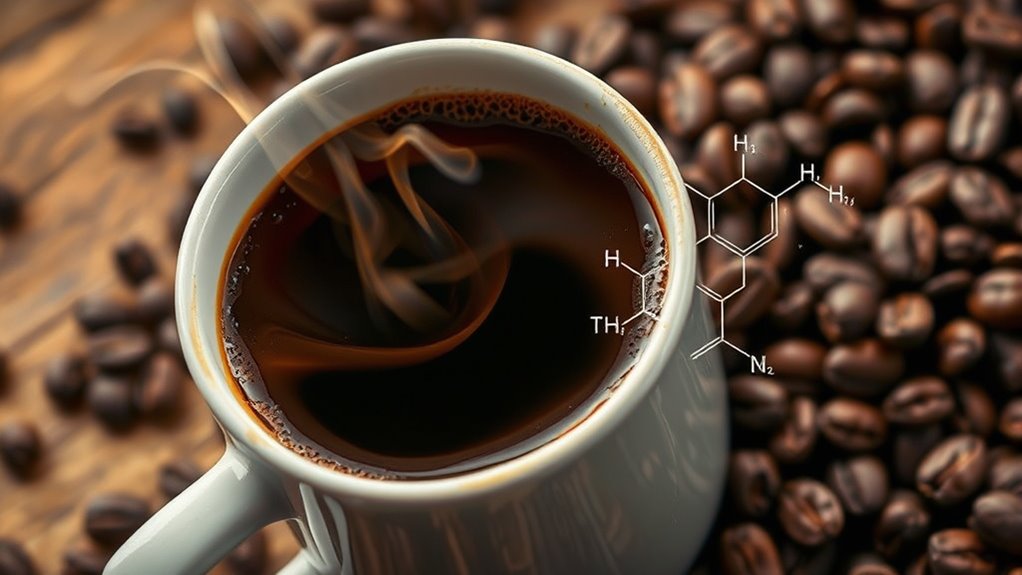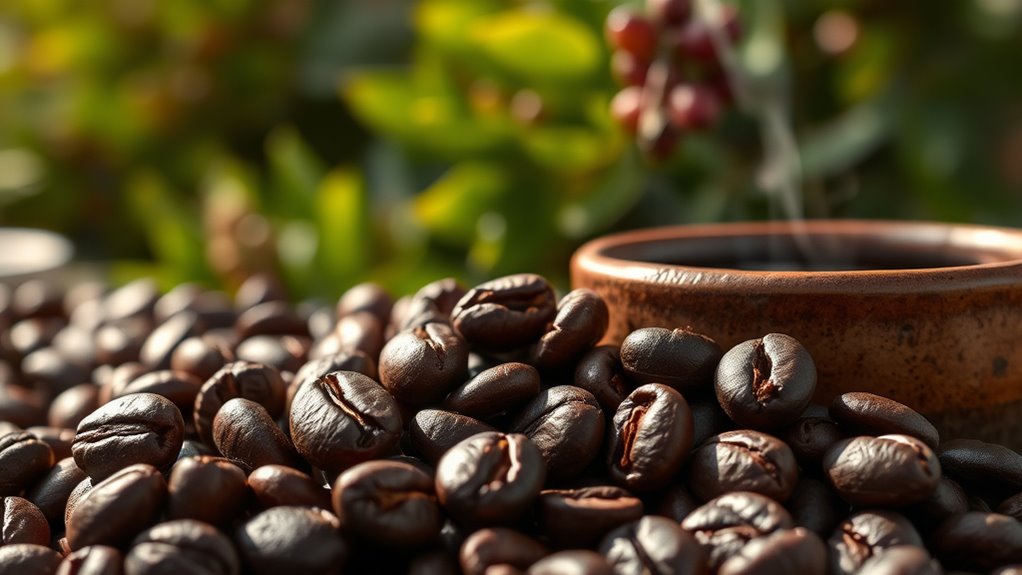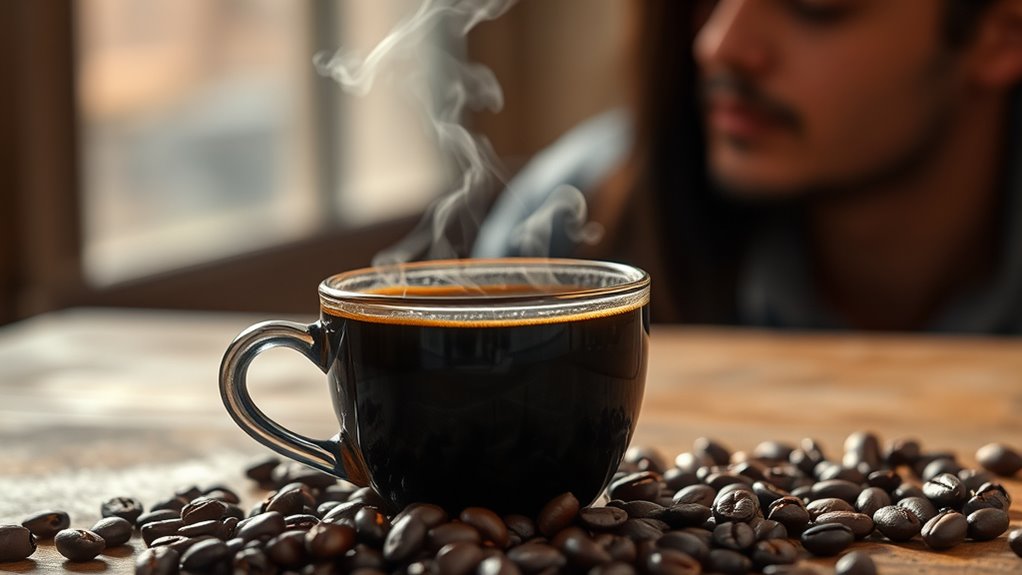Coffee tastes bitter mainly due to chemical compounds that form during roasting and brewing. As the beans roast, chlorogenic acids break down, leading to bitter compounds like phenylindanes in darker roasts. Your sensitivity to these bitter flavors also depends on your unique genetic makeup, particularly variations in the TAS2R43 gene. Different brewing techniques can either amplify or reduce bitterness. If you’re curious about how to enjoy a smoother cup, there’s more to discover.
Key Takeaways
- Bitterness in coffee is primarily caused by chemical compounds formed during roasting, such as phenylindanes and chlorogenic acid lactones.
- Darker roasts contain higher concentrations of bitter compounds due to prolonged roasting processes.
- Genetic factors, particularly variations in the TAS2R43 gene, influence individual sensitivity to bitterness in coffee.
- Brewing techniques, such as water temperature and grind size, can affect the extraction of bitter flavors.
- Coarse grinding, controlled brewing time, and appropriate water temperature can help reduce bitterness in coffee.
The Chemistry Behind Coffee’s Bitterness

When you savor a cup of coffee, you might wonder why it can taste so bitter. The bitterness primarily comes from chemical compounds formed during the roasting process.
As coffee beans roast, chlorogenic acids transform into chlorogenic acid lactones, while prolonged roasting leads to the production of phenylindanes. These bitter compounds activate your taste receptors and contribute notably to the overall flavor profiles of your coffee.
Curiously, the intensity of bitterness can vary based on the roast level; darker roasts contain higher concentrations of these compounds. Genetic factors also play a role, as your sensitivity to bitterness may depend on specific gene variants, like TAS2R43.
The Role of Roasting in Flavor Development

Roasting coffee beans plays an essential role in developing their flavor, as it triggers a series of chemical reactions that transform raw beans into the aromatic delights you enjoy.
During roasting, chlorogenic acids break down into chlorogenic acid lactones, introducing a mild bitterness in lighter roasts. As roasting progresses, phenylindanes form, considerably increasing bitterness in darker roasts. The longer and hotter you roast, the more bitter compounds develop.
Additionally, seven breakdown products of mozambioside emerge, activating bitter taste receptors more strongly than the original compound. By understanding these transformations, coffee producers can create specific flavor profiles while managing bitterness, ensuring you get the perfect cup tailored to your taste preferences.
Genetic Factors Influencing Bitter Taste Perception

As you sip your coffee, you might not realize that your genetic makeup greatly influences how you taste bitterness. Your genetic predisposition plays an essential role in your taste sensitivity to bitter compounds, particularly through the TAS2R43 gene. Variations in this gene can lead to different perceptions of bitterness. For example, some may have variants that lessen their sensitivity to bitter flavors.
| Genetic Variant | Taste Sensitivity | Coffee Intake |
|---|---|---|
| TAS2R43 (defective) | Lower sensitivity | Higher consumption |
| TAS2R43 (sensitive) | Higher sensitivity | Lower consumption |
| Other genetic factors | Variable sensitivity | Mixed consumption |
| PROP sensitivity | Decreased intake | Increased bitterness |
| Quinine sensitivity | Decreased intake | Increased bitterness |
Understanding these factors can help you appreciate your unique coffee experience.
Brewing Techniques and Their Impact on Bitterness

Your genetic sensitivity to bitterness shapes your coffee experience, but the way you brew it can amplify or diminish those flavors.
If you’re not careful with your brewing techniques, you might encounter over-extraction. This happens when coffee grounds are too finely ground or brewed for too long, releasing unwanted bitter substances from the beans. Additionally, using water above 205 degrees Fahrenheit can accelerate this process, negatively affecting the taste.
If you use too much water, it can dilute your coffee and also lead to over-extraction. To achieve a balanced flavor, try coarsely grinding your beans and reducing brewing time.
Enhancing Your Coffee Experience: Tips to Reduce Bitterness

A few simple adjustments can greatly enhance your coffee experience and minimize bitterness.
Start by grinding your coffee beans coarsely; this slows down extraction and helps prevent unwanted bitter flavors from emerging too quickly.
Next, pay attention to your brewing time—stopping the extraction process earlier can keep harsh notes at bay.
Use water at a temperature below 205 degrees Fahrenheit to avoid the early release of bitter compounds during brewing.
Also, limit the amount of water used to reduce the coffee grounds’ exposure, further lowering the chance of over-extraction.
Since taste preferences vary widely, make one adjustment at a time to find your perfect balance without introducing sour flavors.
Enjoy your smoother cup!
Frequently Asked Questions
Why Is Coffee Bitter in Science?
Coffee’s bitterness comes from several compounds, primarily caffeine and mozambioside, with the latter being remarkably more bitter.
During roasting, chlorogenic acids transform into even more bitter compounds, especially in darker roasts.
Your genetic makeup also plays a role, influencing how sensitive you’re to these bitter flavors.
If you over-extract your coffee through fine grinding or long brewing times, you’ll end up amplifying that bitterness, which can affect your overall coffee experience.
Why Does Coffee Taste so Bitter?
When you sip your coffee, it’s like tasting a storm of flavors, with bitterness often stealing the show.
That bitter punch comes from compounds like caffeine and others formed during roasting. If you brew too long or grind too fine, you’re releasing even more bitterness, drowning out the other flavors.
Balancing those bitter notes can transform your cup from a harsh experience to a complex delight, making each sip an adventure for your palate.
What Causes Bitterness in Coffee?
Bitterness in coffee comes from specific compounds formed during roasting.
As the beans roast, chlorogenic acids break down into chlorogenic acid lactones and phenylindanes, which create bitterness.
Your choice of roast matters; lighter roasts usually have a milder bitterness, while darker roasts can be much harsher.
Additionally, how you brew your coffee, like grind size and brewing time, can lead to over-extraction, intensifying those bitter flavors you mightn’t enjoy.
What Is the Science Behind Coffee Taste?
The science behind coffee taste involves a complex interplay of flavors and compounds.
When you brew coffee, various acids, sugars, and oils interact to create a unique flavor profile. The roasting process also plays an essential role, transforming green beans into aromatic delights.
Your taste buds, influenced by genetics, affect how you perceive these flavors. Factors like brewing method and water temperature can further enhance or diminish specific notes, leading to a personalized coffee experience.
Conclusion
As you sip your coffee, remember that bitterness is part of its complex charm, like a hidden layer in a rich chocolate cake. By understanding the science behind it, you can tailor your brewing techniques and savor each cup to your liking. Imagine a perfectly balanced brew, where the bitterness dances harmoniously with sweetness, inviting you to indulge. So, go ahead—experiment and discover the delightful depths of flavor waiting for you in every sip!









